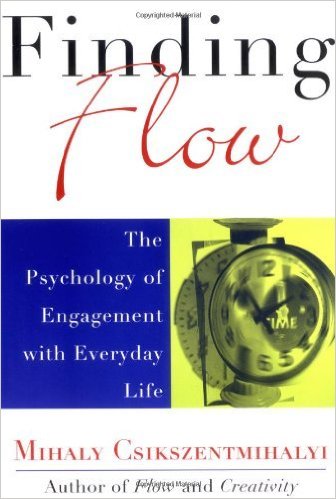Finding Flow: The Psychology of Engagement with Everyday Life

I’ve been a fan of Mihaly Csikszentmihalyi’s work since first seeing his work. I feel like I spend much of my days in “flow” and the description of it helps me to explain to others something that has been difficult to explain. His book Finding Flow: The Psychology of Engagement with Everyday Life is accessible to anyone and talks about the research about how people enjoy – or don’t enjoy their lives and how that is related to the time they spend in the state called “flow.”
Flow is the mental state of operation in which a person in an activity is fully immersed in a feeling of energized focus, full involvement, and success in the process of the activity. It is characterized by a high degree of focus or limited field of attention, loss of self-consciousness – merging action and awareness, and timelessness (loss of time). Flow is intrinsically rewarding and sometimes results in a loss of awareness of bodily needs – so forgetting to eat or go to the bathroom. Situations that encourage flow have a clear set of goals, provide immediate feedback, and provide a balance between the challenge of the task and the skills of the person.
One of the topics that the book covers – albeit lightly is the concept of hedonistic (living for the moment) vs value-based (eudaimonic) happiness. The short of this is that hedonistic happiness is fleeting and requires greater and greater effort to receive the same reward. It operates just like an addiction. Value-based happiness is more persistent occurring overtime and being able to resist the storms of everyday life. (I’m not finished with another book that covers this in much greater detail. It is Who Am I?: The 16 Basic Desires That Motivate Our Actions and Define Our Personalities by Steven Reiss. If you’re interested in this distinction I recommend the book.)
In 2007 I wrote a book review of Daniel Gilbert’s book Stumbling on Happiness where I made a point to talk about how I experienced a travel delay and how I just went with it. Mihaly Csikszentmihaly goes to great lengths to help the reader understand how you can create situations where you’re more likely to have flow and how your attitude about something can radically change how you feel about it.
There were somethings I found profound in the text:
- The Greeks believed the best purpose for “leisure” time was to study. I tend to do that – so it was interesting.
- Extroverts are in a very general sense happier than introverts. However, creative people – particularly those who can balance both introverted and extroverted times are happier still.
- Being alone – working on my own comes just as naturally to me as being with people. The point is made that being able to be alone is a skill that’s acquired.
- I sometimes talk about doing only what I want – but I don’t mean that any more literally than Linus Pauling did when he said it. I mean that I try to create more of the things I like into my world – DVD production is a good example.
So if you’re trying to figure out how to be more productive, to be able to concentrate more, or how to better enjoy your life, check out Finding Flow.
